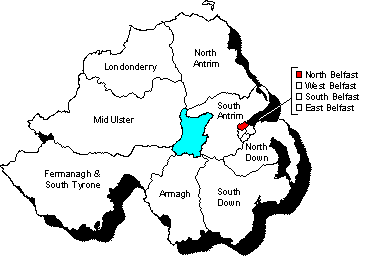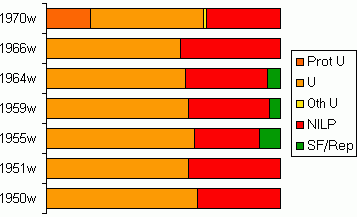

 |

|
|
|
|
|

|

|
| Map and diagram by Conal Kelly | |
Established in 1920, this constituency consists of the northern quarter of the city of Belfast. Between 1950 and 1970 the constituency was represented by two different MPs, both of whom were Unionist. The longer serving of these was Stratton Mills, who was first elected in 1959 and continued to represent the constituency until his retirement in 1974. All seven elections held during this period were contested.
See also election results for North Belfast 1973-1982, 1983-1992 and 1993-2007.
| Prot U | U | Oth U | NILP | SF/Rep | |
| 1970w | 18.9% | 48.4% | 0.7% | 31.9% | |
| 1966w | 57.4% | 42.6% | |||
| 1964w | 59.6% | 34.9% | 5.5% | ||
| 1959w | 60.7% | 35.2% | 4.1% | ||
| 1955w | 63.3% | 28.2% | 8.5% | ||
| 1951w | 60.7% | 39.3% | |||
| 1950w | 64.4% | 35.6% |
Unionist majority: 9,774; electorate: 75,740; votes cast: 78.1%
In
this, his
final Westminster contest, Stratton Mills faced three opponents.
Principal
among these was Jack Sharkey of the NILP, who was hoping to build on
the party's good performance of 1966. Also contesting the election was
William Beattie, deputy leader of Ian Paisley's Protestant Unionist
Party. Rounding out the ticket was leading loyalist and member of the
Shankill Defense Association, John McKeague. Despite the presence of
three unionists on the ballot, Mills' vote held and he was returned to
Westminster with an increased majority of just under 10,000. This
suggests either that Beattie and to a much lesser extent McKeague were
able to pull out voters who had previously not bothered, and/or that
the votes Mills lost to their challenge from the right were balanced
from more moderate voters who had previously abstained, or in a few
cases voted NILP.
During this time Mills was a member of the Unionist 'Truth Squad'
that traveled to the United States and Canada to counter statements
made by Bernadette Devlin. He later became somewhat of a dissident by
not supporting Stormont control of security. He eventually resigned from
the party when Vanguard members were not expelled. He continued to
sit at Westminster, first as an Independent Unionist and then as an
Alliance member from 1973 until the general election in February
1974.
Beattie had been elected to the Northern Ireland House of Commons in
the South Antrim by-election of April 1970. He was also elected to the
Assembly in 1973, the Constitutional Convention in 1975 and the Assembly
in 1982.
Unionist majority: 6,964; electorate: 71,434; votes cast: 65.5%
The incumbent Mills
again defended his seat in the general election of 1966. His sole
competition yet again came from the NILP, fielding a new candidate, David
Overend. Overend polled very well, capturing just under 43% of the
vote and giving the NILP their second best result of the election. His
majority slashed to just under 7,000 votes, Mills had done enough to be
returned to Westminster for a third term.
David Overend had also stood unsuccessfully for the Northern Ireland House
of Commons in 1965 and again in 1969 for the Belfast constituency of Shankill.
He later contested the 1981 Belfast City Council elections as a member of the
Progressive Unionist Party (PUP).
Unionist majority: 12,412; electorate: 72,400; votes cast: 69.5%
The 1964 general
election in North Belfast was essentially a repeat performance of the
1959 election. All three candidates were the same, the only difference
being Frank McGlade was now standing as a Republican (Sinn Fein now
being a proscribed organisation). The result was also essentially the
same, with Mills once again comfortably topping the poll.
McDowell had also stood unsuccessfully for the Northern Ireland House of
Commons in 1962 and again in 1965 for the Belfast constituency of Duncairn.
Unionist majority: 13,533; electorate: 74,494; votes cast: 71.1%
The incumbent Harford Montgomery Hyde was not selected to contest the 1959 general election. The reason for his deselection has been attributed to neglect of the constituency, although Hyde's support for progressive causes including, notably, the decriminalisation of homosexuality cannot have helped (Hyde himself indicated, perhaps tongue-in-cheek, that his deselection was the result of his casting doubt on the sexual orientation of King William III). In his place the Unionists nominated Belfast solicitor, (William) Stratton Mills. Also contesting the election were the NILP's John McDowell and Sinn Fein's Frank McGlade. Never really in any doubt, Mills topped the poll but the Unionist majority was reduced to just over 13,500. The NILP vote improved over their 1955 result, while the Sinn Fein vote dropped by more than half (due largely to the IRA's divisive Operation Harvest campaign).
Unionist majority: 18,680; electorate: 76,990; votes cast: 69.3%
Seeking a third
consecutive (and final) term, the incumbent Hyde once again defended
his seat in the 1955 general election. His primary opposition as
usual came from the NILP, who were fielding new candidate Billy
Boyd. In addition Sinn Fein was contesting the seat for the first time
since 1924 with
their candidate Frank McGlade. The presence of a third candidate
resulted in a split of the non-Unionist vote and Hyde was returned
with an increased majority of over 18,000.
Boyd had stood unsuccessfully in the Belfast Woodvale constituency
for the Northern Ireland House of Commons in 1953 and 1955, before
finally being elected in 1958. He lost his seat in 1965 and was
unable to regain it in the 1969 election. He also stood unsuccessfully
in West Belfast for the 1973 Assembly and in North Belfast for both the
1975 Constitutional Convention and the 1982 Assembly election
(as an Independent). He also contested West Belfast in the Westminster
elections of 1964 and February 1974.
Unionist majority: 12,310; electorate: 76,243; votes cast: 75.7%
In the 1951
general election, the incumbent Hyde defended the seat he had won
just 18 months earlier. As in 1950, his only opposition came from
the NILP, who were fielding a new candidate, James Morrow. The NILP
managed to improve on their 1950 tally and achieve their best
result of the election but could not unseat Hyde who was
returned for a second term.
Morrow had also stood unsuccessfully for the Northern Ireland House
of Commons in 1945 and 1949 for the Belfast constituency of
Duncairn.
Unionist majority: 16,266; electorate: 75,563; votes cast: 74.8%
The incumbent William
Frederick Neill, who had represented North Belfast since 1945, did not
contest the 1950 election. His replacement on the Unionist ticket was
barrister and author, Harford Montgomery Hyde. His sole opponent was William
Leeburn, representing the NILP. Leeburn had contested North Belfast in 1945
and had secured almost 45% of the vote. North Belfast represented one of the
NILP's best chances at taking a seat and expectations were running high. In
the end the NILP vote slipped below their 1945 levels to 35.6% and Hyde was
elected with a majority of over 16,000.
Leeburn had also stood unsuccessfully for the Northern Ireland House of
Commons in 1949 for the Belfast constituency of Willowfield.
See also:
Results from 1950 to 1970 for each seat: East Belfast | North Belfast | South Belfast | West Belfast | North Antrim | South Antrim | Armagh | North Down | South Down | Fermanagh and South Tyrone | Londonderry | Mid Ulster
Other sites based at ARK: ORB (Online Research Bank) | CAIN (Conflict Archive on the INternet) | Northern Ireland Life and Times Survey
Your comments, please! Send an email to me at nicholas.whyte@gmail.com.
Conal Kelly, 1 June 2007.
|
Disclaimer:©
Nicholas Whyte 1998-2004 Last Updated on Wednesday, 12-Jan-2005 12:12
|